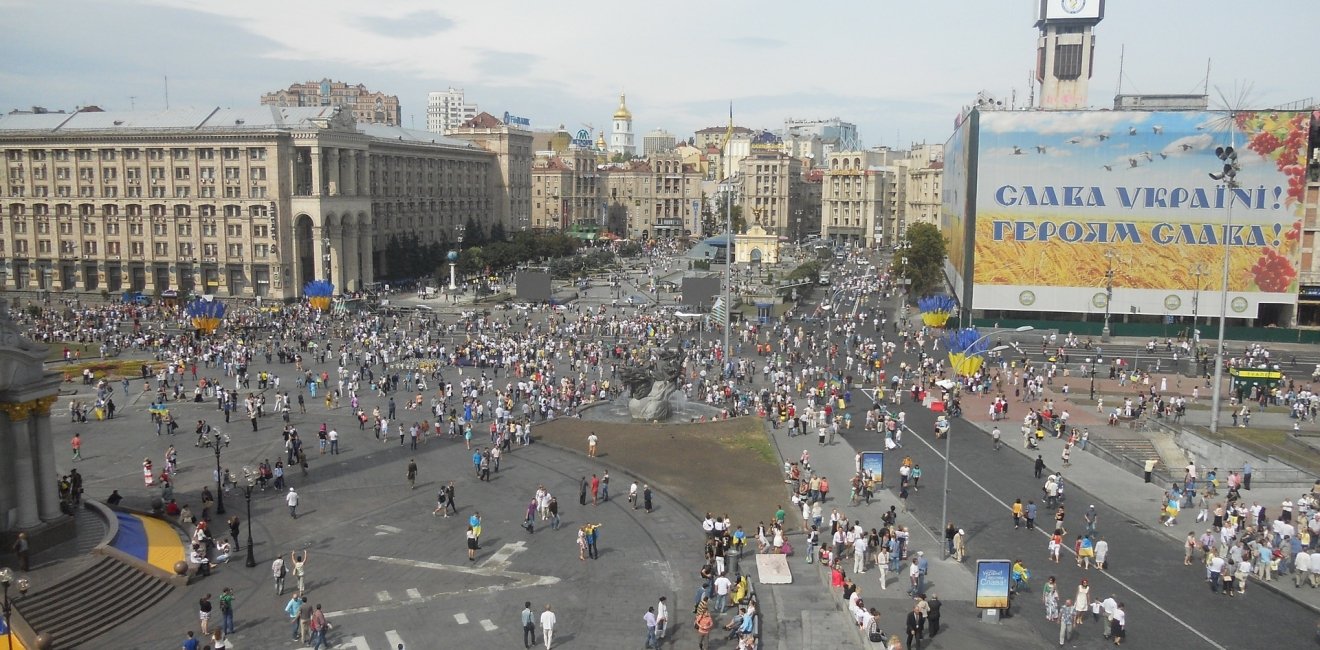
A blog of the Kennan Institute
Today, four years after the start of the Euromaidan, which called for pro-democratic and pro-European choices, Ukrainians are again encouraged to take to the streets, with tent camps of protesters rising near the walls of the Verkhovna Rada. Meanwhile the opposition is again accusing the state of corruption and inefficiency as oligarchs have taken over the offices of high-ranking officials and control the political activity of many parliamentarians. Furthermore, the work of the president and the government still has an extremely low level of public support. Does this mean that Ukraine’s second attempt at a democratic transformation has failed? This question is difficult to answer because the process of political and economic transformation, which began four years ago, remains unfinished. Nevertheless, several important features of the current Ukrainian situation give us some sense of Ukraine’s progress in this direction.
- Despite the shock, the political system demonstrates stability, though opportunities for change have appeared.
It cannot be said that the political system, formed back in the days of the Leonid Kuchma presidency, has undergone major changes. The system is based on the close alliance of business and power, as well as on the reiteration of many of the features of the authoritarian Belarusian and Russian regimes. However, its distinctive feature has been high-level political competition. The ability to influence the decisions of the state has been the main prize in the confrontation between different oligarchic groups, who created and financed various media outlets and numerous political parties to protect their interests. This confrontation has ensured electoral competition for top spots and even some degree of freedom of speech.
Two other significant developments in recent years point to changes in the “business as usual” approach and some opportunity for the political process to free itself from the business alliance and become more open.
The first change is the diminished role of the oligarchs. As a result of the economic crisis, the loss of Crimea, and the conflict in the Donbas, the economic and political positions of the oligarchs have significantly weakened. State power has traditionally been a resource enabling them to ensure personal well-being. In the current situation, however, they are more than ever in need of support from state power for the preservation and development of their businesses. At issue are the preferences and benefits that power can provide business, as well as protection, in the process of privatization, of the interests of Ukrainian oligarchs against foreign competitors, whose economic positions are significantly stronger than the positions of Ukrainian businessmen. The current situation forces the oligarchs to exchange support from the authorities for loyalty—the loyalty of the media they own and the loyalty of those members of parliament they control. As a result, in Ukraine, conditions have been created that may allow the president to control the parliamentary majority, big business, and leading mass media outlets.
The second significant structural change after the Euromaidan was the creation of anticorruption agencies (the National Anti-Corruption Bureau of Ukraine, the Special Anti-Corruption Prosecutor’s Office, and, in the future, the Anti-Corruption Court), whose existence threatens the existing system. These agencies operate independently of state power, and their activity undermines the alliance of business and government. Today the state is making great efforts to take control of the anticorruption agencies, while the formation of the Anti-Corruption Court has been delayed. This is the best evidence to date that the effective work of the anticorruption agencies offers a chance to refresh the Ukrainian political system, making it more democratic and open.
- Street democracy and direct action remain the only effective means for citizens to influence the decisions of the authorities.
For most Ukrainian citizens, state power is still as remote as it was before the Euromaidan. Given its level of corruption and its uncontrollability, such power is not trusted. This is because Ukraine still has no effective democratic institutions that allow citizens to influence the work of government, hence the constant threats from the opposition to bring people into the streets again.
According to sociological research data, the situation in Ukraine is very similar to the one that exists today in Moldova, which is what distinguishes these two countries from the other four post-Soviet countries that are members of the EU’s Eastern Partnership initiative. As polling data (spring 2017) from the EU-funded OPEN Neighbourhood project show, the citizens of Ukraine and Moldova have extremely low levels of trust in national institutions.
Thus, in Georgia, trust in the government and in parliament is at 48 percent and 43 percent, respectively, and in Azerbaijan the figures are respectively 81 percent and 57 percent. In Moldova, by contrast, the figures are 24 percent and 13 percent, and in Ukraine, 9 percent and 6 percent. Moreover, trust in political parties in Ukraine is at only 5 percent. In Moldova the figure is 15 percent, in Georgia it is 27 percent, and in Azerbaijan it is 43 percent. The picture is similar regarding answers to the poll question about satisfaction with democracy. In Moldova 11 percent of respondents were satisfied with the way democracy works in their country and in Ukraine 15 percent were satisfied; the average for the six Eastern Partnership countries was 21 percent. Finally, in response to the poll question about which elements characterized their country, respect for human rights and the rule of law were cited by only 9 percent and 8 percent of Ukrainians, respectively; by 23 percent and 15 percent of Moldovans; and by 48 percent and 38 percent of Azerbaijanis. Meanwhile, the average for the Eastern Partnership countries was 23 percent and 24 percent, respectively.
The existing problems should be solved by political and civil service reform. However, significant progress in the implementation of the necessary changes has not been observed. Moreover, we see regression in the sphere of civil service reform. In 2015, for example, Ukraine’s parliament adopted a new version of the law on public service that provided for the separation of political and administrative posts. In particular, the heads of regional administrations were to be elected by competition rather than appointed. In November 2017, however, the Verkhovna Rada voted to approve, and the president signed, amendments to this law that repealed the separation of political and administrative positions. Moreover, the president now has ample opportunity to dismiss the heads of regional administrations. These amendments have gone into effect; therefore, the results of the reform are essentially worthless.
- Democratic development has faced new threats.
The social transformations of recent years have brought with them two serious threats.
The first threat is disappointment in the choice of democracy and a European vector of integration. Again, there is a similarity between the situation in Ukraine and that in Moldova. The election of Moldova’s president, who is openly sympathetic to Moscow, and growth in the number of Customs Union supporters among Moldovans afford an opportunity to talk about the emerging pro-Russian turn in Moldova. The factors that allowed this to happen are largely in place in Ukraine as well. Here I want to highlight three main factors or prerequisites:
- A difficult economic situation and growing frustration over delays because an association with the EU would bring about substantial economic success.
- Disappointment regarding the ability of the EU and NATO to function as an external means of control over the corrupt national elite. For example, poll data have shown that when the EU authorities started criticizing the actions of Moldovan authorities, support for the EU in Moldova increased. As explained by the Moldovan sociologist Dionis Cenuşa, lack of criticism from the EU is perceived by Moldovans as a sign of European support for Moldovan corruption and an oligarchic government. For countries such as Ukraine and Moldova, the EU and NATO are needed not only as a model for their own transformation but also as an external means of control over the situation in the state and among the national elites.
- Disappointment in the European and NATO perspective. The lack of a clear perspective for integration into the EU and NATO in the context of such crises as Brexit and the growth of right-wing populism in Europe and both European and American isolationist sentiments is confusing. When the West sends mixed signals, it is difficult to expect stability from Ukrainians.
The emergence of the “Moldovan scenario” in Ukraine is far from expected, the military conflict with Russia being one of the major obstacles in this regard. But should disappointment with Western institutions grow, it will be a significant obstacle to the political development of the country.
The second threat is populism and radical nationalism. The threat of populism and radicalism is always high for states experiencing crisis, especially in conflict situations. If the Euromaidan began as an attempt to build a democratic state, today the politically active part of society is consolidated around the idea of victory in the conflict with Russia. The danger is that these two tasks are not always seen as interrelated, while the conflict has helped strengthen right-wing political forces. Under pressure from radicals (who are in fact the leaders of protest movements in today’s society), the authorities often make decisions that remove Ukraine from both European and Ukrainian contexts. Of particular concern is the forced Ukrainianization of the educational system, which has provoked criticism from within Ukraine and European countries. In turn, the language issue has fed the confrontational politics of memory, which has led to a deterioration in Ukraine’s relations with Poland and other close neighbors. Consistently pursuing a socially conservative policy in a multinational and multicultural country, which Ukraine actually is, undermines social cohesion and stimulates internal confrontations. This, in the end, only plays into Russia’s hands.
- Changes are possible.
Today, Ukraine urgently needs support for democratic reforms, but a significant change in course heading is possible only if the country becomes more integrated into Western institutions than it is now. Reflecting on the political role of NATO, Kimberly Marten in a report for the Council on Foreign Relations noted that NATO provides “protection not merely from Russia but within Europe itself” because if radical nationalists were to come to power in any European country, the implementation of their militaristic plans would require an expensive overhaul of force capabilities. In a certain sense, this formula is applicable to the integration of Ukraine into the EU. Ukrainian democratic development is now hostage not only to the aspirations of Ukrainian citizens but also to the willingness of leading democratic countries to participate in the development of democratic institutions in Ukraine and the protection of civil rights in the country.
Author


Kennan Institute
After more than 50 years as a vital part of the Wilson Center legacy, the Kennan Institute has become an independent think tank. You can find the current website for the Kennan Institute at kennaninstitute.org. Please look for future announcements about partnership activities between the Wilson Center and the Kennan Institute at Wilson Center Press Room. The Wilson Center is proud of its historic connection to the Kennan Institute and looks forward to supporting its activities as an independent center of knowledge. The Kennan Institute is committed to improving American understanding of Russia, Ukraine, Central Asia, the South Caucasus, and the surrounding region through research and exchange. Read more

Explore More in Focus Ukraine
Browse Focus Ukraine
Talking to the Dead to Heal the Living

Ukrainian Issue in Polish Elections


